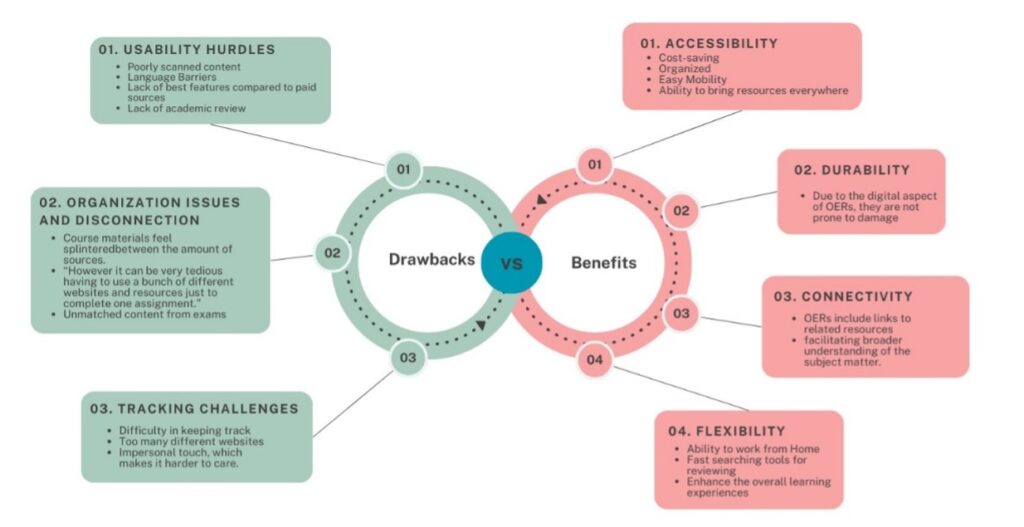By Daniela Guirola, psychology student, Capilano University
The discussion around the integration of open educational resources (OER) has elicited an enthusiastic, yet skeptical response from students. In her work as a BCcampus Research Fellow, Alea Rzeplinski, explored this debate.
In collaboration with Alea Rzeplinski, a BCcampus Research Fellow and psychology honours student, and Douglas Alards-Tomalin, psychology faculty and student advisor, we examined the accessibility of open educational resources, their usefulness, and any barriers they may pose. We hope that through this study we will learn more about how students perceive and experience OER in their courses and increase awareness about the issues that come with the use of OER.
We asked the following questions of students in our research:
- If you have de-registered from a course due to open educational resources being listed as a required course material, please explain why.
- What are the drawbacks/benefits, if any, of using open educational resources in course materials?
- What changes could be made, if any, to improve your experience(s) with and/or reduce any barriers using open educational resources?
To explore the qualitative aspects of using OER, we performed a thematic analysis on the data and found several common outcomes.
De-registration Dilemma: Challenges
Our sample highlighted the challenge of understanding course content delivered asynchronously. Students believed that while OER offer significant benefits, some purposely select courses not requiring them. As one survey respondent stated, “I sometimes avoid courses requiring a certain OER due to the added difficulties OER may bring, like lack of clarity or outdated information.” While some students appreciated the ability to choose the learning methods, the number of resources may lead to a sense of detachment among course materials, exams, and outside sources. According to one respondent, “Course materials can feel splintered between the many resources available to you, […] which can lead to a feeling of disconnect between course materials and content learned in class.”

Depending on the course material, students often prefer personalized help, having a professor’s approval of the material, and assistance while navigating it, which allows them to care more for the content. While learning is something we ultimately do on our own, having access to someone to provide and correct information helps most students’ confidence in their understanding. The issues raised demonstrate the relevance and adequacy of the OER depend on the instructor.
Despite the accessibility and cost-saving benefits, as well as the longevity associated with these sources, some students opted out because the OER did not fit or complement the course. As one student described their experience, “The content may not match with material on exams, despite being the same topic.” They also claim to offer flexibility in terms of location and fast research tools, but in some cases, OER may be out of date.
Students also mentioned several usability issues related to OER, like lack of quality content, and poorly scanned documents, making it difficult to keep track of the information. Some resources have unclear images and language barriers may be difficult to work around. This is due to the lack of extra features that most paid sources have. As one respondent noted, “Some materials are not easy to read (textbooks scanned incorrectly) but the lack of cost is extremely beneficial.”
“While learning is something we ultimately do on our own, having access to someone to provide and correct information helps most students’ confidence in their understanding.”
— Daniela Guirola
A recurring theme throughout the study is the expense of the textbooks. “It feels like we already pay so much for the classes and then have to pay a bunch of extra money to have these resources that should already be available to us,” responded one student. Some respondents even implied the unfairness of paying extra for course materials instead of these being included in the course prices.
Due to these overall concerns, respondents proposed ways to improve their experiences. They suggest that the cost of textbooks, and essential materials, be included in the course fees. Alternatively, OER need a vetting process from the instructors to ensure quality before being incorporated into course materials. Following this, the OER should be integrated directly into the course to bridge the gap between in-class content and outside sources. Also, instructors’ OER preferences can vary significantly, ranging from features such as quizzes, notes, and flashcards, to the availability of a PDF version. Further, considering students may be deterred from courses if the OER are challenging to navigate, disjointed, or poorly integrated, there is a growing need for additional support or a user-friendly approach to the resources offered. Finally, instructors should consider limiting the number of sources, keeping the number of OER in their courses to a manageable level while fully integrating them into the course.
About the Author: Daniela Guirola, a fourth-year international student, is currently pursuing her degree in psychology at Capilano University. Raised in a small Latin American country with a traditional educational system, she found herself navigating a vastly different academic environment during her studies including learning in English, which is not her first language. Moreover, the exorbitant cost of textbooks, amounting to three times the cost of her health insurance, adds to the financial challenges she continues to face as a student.
Guirola emphasizes the pressing need for post-secondary institutions to acknowledge and address the financial burdens borne by students. She advocates for measures aimed at reducing the financial barriers associated with higher education. Guirola draws inspiration from the work of Alea Rzeplinski, a BCcampus Research Fellow for 2022-2023, highlighting the importance of accessible education and its far-reaching impact on all students.
